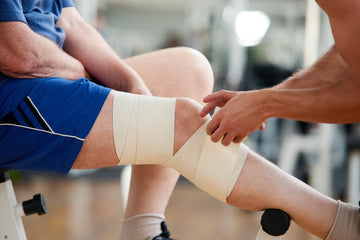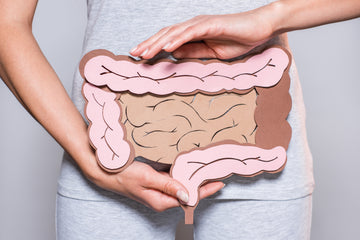Running is a popular form of exercise that offers numerous benefits for both the body and mind. Whether you're a seasoned marathoner or just starting out on your jogging journey, incorporating running into your routine can have a profound positive impact on your overall well-being.
Why is running good for you and how does it affect your body? Today, we’re exploring the benefits of running for physical, mental, and social well-being. We’re also giving you ways to prevent injuries while running as well as easy home recovery options to keep you up on your feet and ready to hit the pavement once again.
Why Is Running Good For You?
Before we begin, why is running good for you? Running benefits you mentally and physically, engaging the entire body, promoting overall fitness, and contributing to a healthier lifestyle. It’s an effective form of exercise that can be easily incorporated into daily routines, making it a great option for people of different fitness levels and age groups.
When we run, our bodies undergo a series of changes that affect our minds and bodies. As our heart rate increases, better blood circulation increases oxygen delivery to the muscles. This, in turn, enhances cardiovascular fitness, strengthens the heart, and may stimulate the brain for better decision-making, higher thinking, and learning.
For those who may experience health conditions that prevent them from traditional running, there are low-impact options such as using an elliptical, as well. Overall, the combination of physical and mental health benefits makes running a fantastic activity for promoting overall well-being.
Physical Benefits of Running
We’re starting our discussion of why running is good for you with the physical benefits of running. No matter if you’re competing as an athlete or going for a casual run for pleasure, there are a plethora of potential benefits you may experience. As always, consult your doctor before starting any new health routine to ensure it’s safe for you to do so.
Some of the physical benefits of running include:
- Cardiovascular health: Running is an aerobic exercise that engages the cardiovascular system and elevates your heart rate. Running benefits heart health by strengthening the muscle and improving overall cardiovascular fitness.
- Better lung capacity: Running benefits lung capacity, enhancing oxygen delivery to your muscles, and improving the efficiency of your circulatory system. This improvement can help reduce the risk of cardiovascular diseases such as heart attack, stroke, and high blood pressure.
- Weight management: Running is a fantastic way to manage body weight. It is a high-calorie burning activity that engages multiple muscle groups and elevates the heart rate. Burning the excess calories promotes fat loss and contributes to maintaining a healthy weight.
- Reduced risk of chronic diseases: The benefits of running have been associated with a decreased risk of chronic diseases. Studies have shown that running can help regulate blood pressure, improve cholesterol levels, and enhance insulin sensitivity. These running benefits may aid in reducing the risk of negative health conditions such as heart disease, type 2 diabetes, and even certain types of cancer.
- Stronger muscles: When you’re running, you’re using your body weight as a counterweight to work against. This form of exercise engages multiple muscle groups in your body, including your legs, core, and upper body. Stronger muscles not only enhance athletic performance but also contribute to other physical benefits of running like improved posture and stability.
- Better bone density: Running benefits bone health and can be a potentially-effective method to prevent health conditions like osteoporosis. The repetitive stress placed on the bones during running leads to increased bone density and strength. This is particularly important, especially as we age, to maintain healthy bones and reduce the risk of fractures.
- Increased immune system: Running on a regular basis may help strengthen the immune system keeping you healthy and able to fight off illnesses and infections more effectively. Excessive running without proper post run or post race recovery could lower your immune system temporarily.
While running provides numerous physical health benefits, it’s essential to practice injury prevention to maintain healthy and sustainable running routines. Incorporating proper warm-up and cool-down stretches and exercises, gradually increasing distance, and listening to your body's signals can help reduce the risk of running-related injuries.
Mental Benefits of Running
Beyond its physical advantages, running benefits mental health in a variety of ways, too. If you’ve ever experienced a “runner’s high” or felt reinvigorated after a good run, then you know just how strong the mental health benefits of running can be.
Some of the mental health benefits of running you may experience are:
- Reduced symptoms of depression and anxiety: Running has been shown to be a powerful mood booster and a natural remedy for symptoms of depression and anxiety. When you run, your brain releases endorphins, often referred to as "feel-good" hormones. These endorphins promote a sense of well-being and can help alleviate symptoms of depression.
- Improved happiness and stress reduction: The release of endorphins during a run helps create a positive mindset. It provides stress relief by allowing you to disconnect from daily worries and focus on the present moment. The rhythmic nature of running and the release of tension in the muscles may even bring you to a meditative state, promoting mental clarity and relaxation.
- Enhanced cognitive function: Running benefits cognitive function by increasing blood flow to the brain, supporting optimal brain health. It may enhance cognitive abilities such as attention, memory retention, and information processing. The benefits of running may also improve creativity and problem-solving skills.
- Better sleep quality: Exercise like running has also been associated with improved sleep quality. Engaging in physical activity helps regulate your sleep-wake cycle, making it easier to fall asleep while promoting deeper, more restorative sleep. Quality sleep is crucial for mental health and can contribute to improved mood, cognitive function, and overall well-being.
Incorporating running into your routine can have profound positive effects on your mental health. Remember that it's important to listen to your body, set realistic goals, and prioritize self care and recovery as you start on your running journey.
Social and Community Aspects of Being a Runner
Some of the benefits of running you may not have thought much about are the social and community aspects of being a runner. While you may go for runs by yourself, there is a supportive community for running enthusiasts that you’re part of no matter what.
Many cities have organized running groups and clubs where individuals can connect with like-minded people, share their experiences, and participate in group runs. Being part of a runner community can provide a sense of belonging, motivation, and support, fostering social connections and friendships.
Home Recovery for Runners
Recovery plays a significant role in a runner's overall well-being and performance. After a strenuous run, it is important to allow the body to rest and recuperate. Not only does this help your body recover after running, but it’s an effective method for how to avoid running injuries next time, too.
Stretching after a run is vital to prevent muscles from seizing up or becoming stiff. It also helps increase flexibility, improve circulation, and alleviate muscle tightness. Before a run, dynamic stretches prepare the body for physical activity. After a run, static stretches may be ideal for working out any overexertion you experienced during your run. You may also consider going for a short walk at the end of a run to slowly bring your heart rate down and relax the body without simply stopping activity right away.
Heat and ice therapy are also effective home recovery methods for runners. The benefits of heat therapy include increasing blood flow, promoting relaxation, and alleviating muscle stiffness. Heat can be applied using warm towels, heating pads, taking a hot bath, or using heated massage chairs for a full-body home recovery experience. Applying an ice pack or ice wrapped in a towel to areas exhibiting swelling or inflammation may provide temporary pain relief and promote faster recovery for runners, as well.
While there are various home recovery options available, one method that stands out is using a massage chair. Massage chair benefits for athletes improve on smaller, targeted tools like a massage gun and provide recovery for runners from head to toe. Offering a variety of different types of massage programs, runners can determine exactly what they need, and at what intensity level, to work out any muscle soreness and stay in optimal condition.
Unlike traditional massage therapy appointments, runners can use massage chairs any time they need from the comfort of home. It avoids the never-ending costs of additional massage appointments and circumvents the potential stressors of fitting an appointment into a busy schedule or needing an appointment immediately if you’re injured.
Is running good for you? The verdict is in and the answer is yes. The benefits of running positively impact your physical, mental, and social well-being. It aids in the development of a healthier lifestyle for people at almost any fitness level and provides a sense of community that pushes you to new heights. As with any form of physical activity, be sure to listen to your body’s needs and practice self care activities like stretching and choosing a massage chair for home recovery to stay in top condition.





